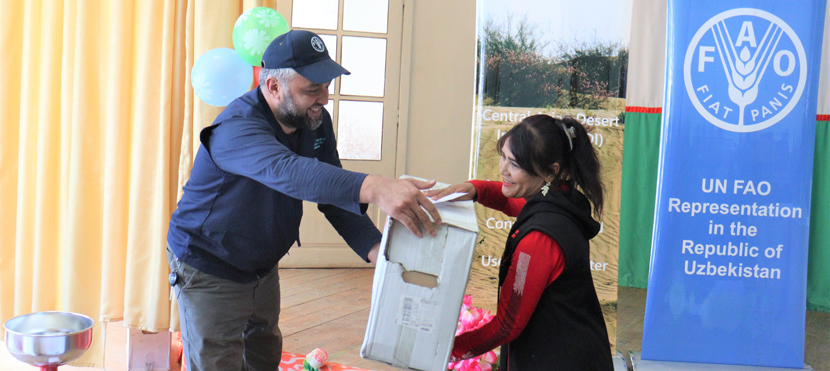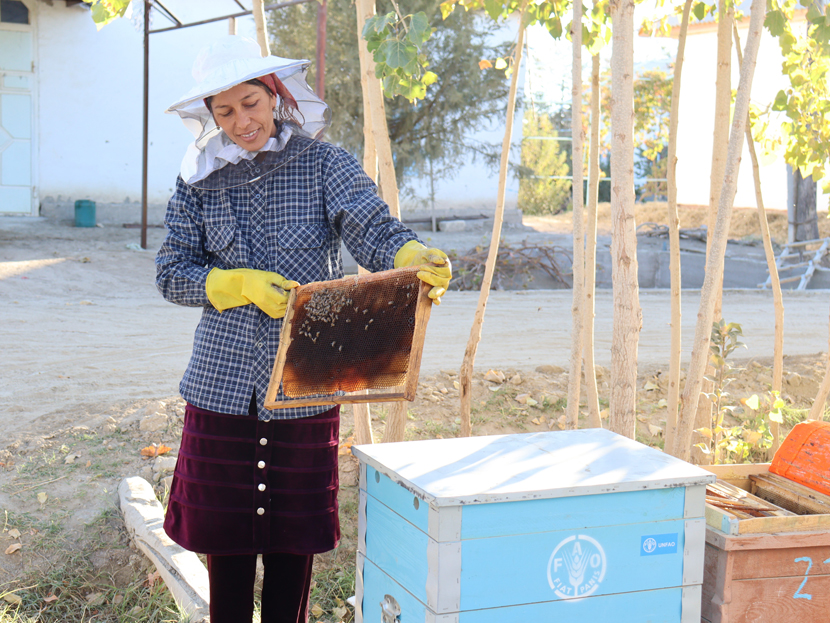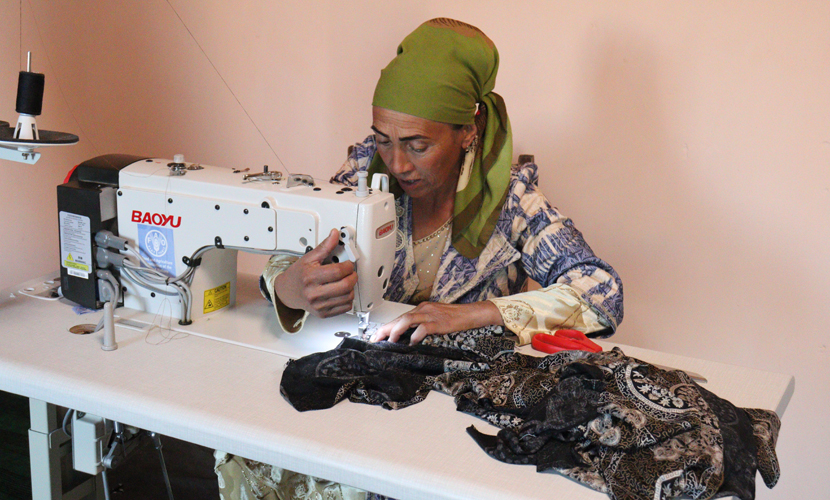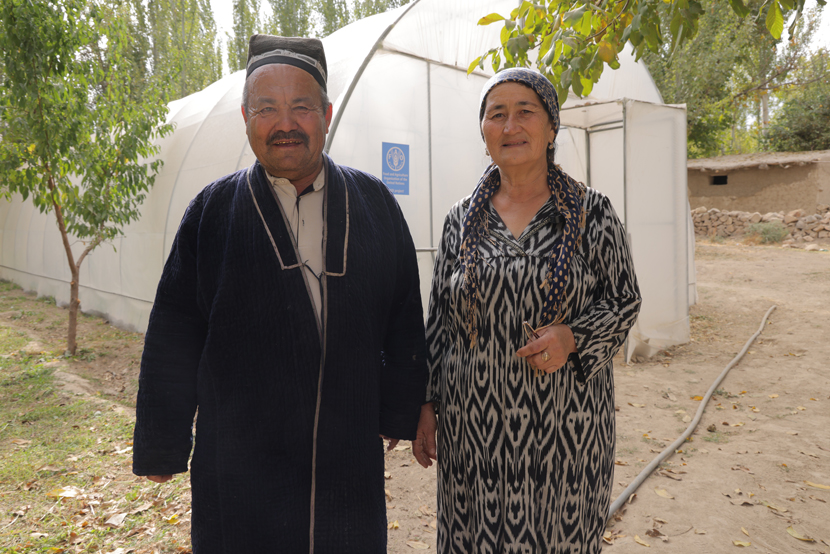“Give a man a fish and he will eat for a day. Teach a man how to fish and you feed him for a lifetime.” – the Central Asian Desert Initiative (CADI) provides a good example of this ancient eastern proverb. The project was implemented in 2017-2022 by the Food and Agriculture Organization of the United Nations (FAO) in cooperation with the University of Greifswald, the Michael Succow Foundation with financial support of German government. The project has already been finished, but its impact will last for many years for the rural communities living in temperate desert regions of Uzbekistan. Thanks to this project, smallholders opened up new sources of income resulted in sustainable and increased livelihoods as well as confidence in the future.
Most important, new sources of income enhance the living standard of the population. This was experienced by the rural communities of the “Durmon” village of Karakul district in Bukhara province and of the “Chuya” village of Nurota district in Navoi province. They are beneficiaries of the CADI project who have received support for further development of alternative income-generating activities such as greenhouse management, sewing and milk processing in temperate desert conditions.
– During the implementation of the Central Asian Desert Initiative in 2022, we provided smallholders in project areas with agricultural and other equipment, namely 45 small greenhouses were installed in their household plots, 57 women received handicraft equipment including sewing, carding and stitching machines. In addition, milk separators, milk pasteurizers and refrigerators were distributed among 77 women in the project areas. Moreover, 3 beneficiaries received special equipment for the development of beekeeping. Uniting into small groups of producers and using a skilful approach farmers can make good profits through all of this, improving their livelihoods. The total cost of equipment distributed under the CADI project amounted to about 200 thousand dollars, – said Nariman Nishanov, National Coordinator of the CADI project in Uzbekistan.
It is important to note that the CADI project not only provided beneficiaries with expensive equipment, but also organized special training course on how to use this equipment and extract the maximum, sustainable profit from it. In 2020, the project conducted a series of Farmer Field School sessions on improved crop production, greenhouse nursery development and basic beekeeping for 152 smallholders (including 57% of female participants) in the project areas – the “Durmon” village of Karakul district in Bukhara province and the “Chuya” village of Nurota district in Navoi province. In October last year, the workshops on business and craft skills were organized for 57 women, who learned the sewing skills, national embroidery and wool blankets production as well as the basics of marketing.
Nazira Egamberdieva, one of the active training participants, brought her female neighbours and friends, about 20 people, to the classes, telling them what a good opportunity it is to master sewing and needlework skills. Like other beneficiaries, she received from the CADI project a sewing machine and, in addition, an overlocker, with the condition that she would lend it to other women in the area and teach them sewing. A professional tool does not stand idle – every day Nazira sews dresses, frock coats, children’s clothes, coats and other things, earning good money. And she has a lot of students – rural women realized that needlework and sewing can bring additional income.
– Thanks to the sewing equipment donated to me by the project, I now earn from 70 to 100 thousand sums a day, – says Nazira Egamberdieva. – We have many orders, all goes well since the machines are new, modern and have many different functions. My daughter quickly mastered the sewing skills and now helps me with everything. It is nice to see how my neighbours and friends also started to bring additional income to their households through sewing and needlework. And I’m always ready to help them with professional advice.
It is encouraging that the CADI project contributed to the job opportunities in remote rural areas. As part of the project, the “Chuya Marvarid” sewing workshop, located in the Nurata district of the Navoi province, received a special equipment for processing cotton and wool, as well as a quilting machine for making quilted blankets from wool and cotton. With putting all this into operation 5 women were provided with job, and it is planned to organize training for another 10 people here.
In May 2022, together with the Rural Women Association of Uzbekistan the CADI project organized training sessions for women from target areas on production of dairy products using new equipment. Overall, 60 women took part in the trainings. For several days they studied advanced livestock breeding techniques and also learned how to use milk separators and milk pasteurizers received under the project. Trainers explained them how the use of modern technologies enhances the productivity in milk processing.
“It is not difficult to use a milk separator, we can quickly get natural sour cream and butter at home, while saving time and effort. And after skimming milk, we can make cottage cheese and cheese, these products are always in great demand. In general, this is an important and necessary device for our household”, – says Nafosat Narziyeva, a resident of the Durmon village of the Karakul district located in the Bukhara province. “Previously, we did not have a refrigerator, we had to store food in cool dark places in the old fashioned way, and on hot summer days this did not help either – the milk quickly spoiled. Since we have received a new big refrigerator, things are going much better. We have everything to independently and quickly produce and properly store dairy products for sale. This is a profitable business, thanks to which we will increase our income.”
And there are many such stories among the beneficiaries of the CADI project – in greenhouses and beekeeping as well. Smallholders successfully solve household issues, expand their activities. The project provided these people with a stable source of income in the long term, which seems to be the most important determinant of well-being and satisfaction with life.
For example, pensioner Abduakhad Utashev from Nurata district of Navoi region proudly showed the CADI project team his own grown cucumber harvest, which ripens in a greenhouse donated and installed on his garden plot by the project. His family members help him with work in the greenhouse. And soon he plans to plant tomatoes and greens there.
“Now we will always have fresh vegetables on the table, and we sell part of the harvest on the market – this is a profitable business,” says Abduakhad Utashev.
The CADI (Central Asian Desert Initiative) project is aimed at preserving biodiversity and sustainable use of the temperate deserts of Kazakhstan, Turkmenistan and Uzbekistan, which represent unique ecosystems and are habitats for rare species of animals and birds. The project was funded by the German Government and was implemented in Kazakhstan, Turkmenistan and Uzbekistan from 2017 to 2022 by the University of Greifswald, the Michael Sukkow Foundation and the Food and Agriculture Organization of the United Nations (FAO). Under the scope of the CADI project, a Regional CADI Secretariat was established and will be based in the State Forestry Committee of Uzbekistan to continue the activities of the project on conservation and sustainable use of the temperate deserts in Central Asia.



